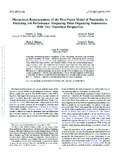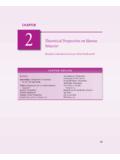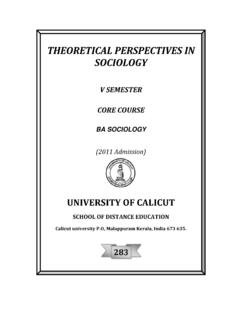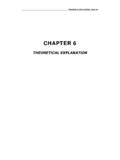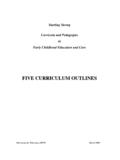Transcription of The Null Curriculum: Its Theoretical Basis and …
1 The null curriculum : Its Theoretical Basis and Practical ImplicationsAuthor(s): David J. Flinders, Nel Noddings, Stephen J. ThorntonReviewed work(s):Source: curriculum Inquiry, Vol. 16, No. 1 (Spring, 1986), pp. 33-42 Published by: Blackwell Publishing on behalf of the Ontario Institute for Studies in Education/University ofTorontoStable URL: .Accessed: 04/01/2012 09:18 Your use of the JSTOR archive indicates your acceptance of the Terms & Conditions of Use, available at . is a not-for-profit service that helps scholars, researchers, and students discover, use, and build upon a wide range ofcontent in a trusted digital archive. We use information technology and tools to increase productivity and facilitate new formsof scholarship.
2 For more information about JSTOR, please contact Publishing and Ontario Institute for Studies in Education/University of Toronto are collaboratingwith JSTOR to digitize, preserve and extend access to curriculum null curriculum : Its Theoretical Basis and Practical Implications DAVID J. FLINDERS, NEL NODDINGS, and STEPHEN J. THORNTON Stanford University ABSTRACT In this essay we take a critical look at the concept of " null curriculum "-what schools do not teach-and ask two questions: 1) Can the term " null curriculum " be defined adequately for curriculum theorizing?, and 2) Is this concept in any way useful for practice? Our consideration of the null curriculum centers on its possible uses in terms of theory, research, and practice.
3 In each of these areas, particular attention is given to the problems involved in clearly defining this rather ambiguous concept. We note that conceptions of curriculum play the dominant role in how null curriculum is defined, and point out that a given null curriculum can be identified only in relation to what is valued as educationally significant. Although the notion of null curriculum cannot be defined in precise terms, we conclude that it does have worthwhile application in certain practical areas of curriculum development and evaluation. It is not uncommon for two curriculum specialists to discuss their field at great length before discovering that each is using the term " curriculum " to mean something quite different.
4 In discussing curriculum , therefore, we often feel compelled to make distinctions between various curricular perspectives such as "interactive," "preactive," "explicit," "hidden," "in- tended," and "actualized." Moreover, it would seem that curriculum theorists are forever busy inventing new terms to describe different aspects of curriculum theory that have previously gone unexamined. Unfortunately, this plethora of terms and competing definitions often contributes to the general confusion in a field that is, by its very nature, loaded with ambiguities. In this essay, we take a critical look at one such expression, "the null curriculum ," and ask two questions: 1) Can "the null curriculum " be defined adequately for curriculum theorizing?
5 And 2) Is this concept in any way useful for research or practice? ? 1986 by the Ontario Institute for Studies in Education. Published by John Wiley & Sons, Inc. curriculum INQUIRY 16:1 (1986) CCC 0362-6784/86/010033-10$ D. J. FLINDERS, N. NODDINGS, AND S. J. THORNTON/CI Defining the null curriculum Elliot Eisner (1985) suggests that all schools "teach" three curricula: the explicit, the implicit, and the null . The explicit curriculum simply refers to publicly announced programs of study-what the school advertises that it is prepared to provide. Such a program typically includes courses in mathematics, science, social studies, English, art, and physical educa- tion. The implicit curriculum , on the other hand, includes values and expectations generally not included in the formal curriculum , but never- theless learned by students as part of their school experience.
6 All stu- dents, for example, learn that knowledge can be divided into subjects and labeled "math," "English," "art," "biology," "history," and so on; or, that the distance between excellence and failure can be measured in increments of A, B, C, D, and F. The null curriculum Eisner defines as what schools do not teach: .. the options students are not afforded, the perspectives they may never know about, much less be able to use, the concepts and skills that are not part of their intellectual repertoire (1985, p. 107). The null curriculum explicitly calls our attention to what has long been a matter of common sense-that, when developing a curriculum , we leave things out. It is a truism of the curriculum field that schools cannot teach everything.
7 Like economists concerned with the distribu- tion of scarce goods, curricularists must be concerned with the allocation of limited school resources to educationally beneficial ends. As all eco- nomic wants cannot be satisfied, all demands for curriculum inclusion cannot be met. Although this observation may seem obvious, it is not trivial. Some notion of a null curriculum underpins much of our think- ing on curricular issues. For example, radical social theorists, such as Michael Apple, attach seminal importance to a given null curriculum for certain social classes. Their use of the null curriculum , although largely implicit, is fundamental to defining the boundaries of their concern for educational equality. Eisner argues more generally that what is not taught may be as educationally significant as what is taught: I argue this position because ignorance is not simply a neutral void; it has important effects on the kinds of options one is able to consider, the alternatives one can examine, and the perspectives from which one can view a situation or problem (1985, p.)
8 97). In effect, Eisner is claiming that the null curriculum is, whether recog- nized or assumed, an educational issue of the first order. Given that several nationally recognized studies ( , A Nation at Risk, 1983; Boyer, 1983; Goodlad, 1984; Sizer, 1984) have recently proposed major curric- ular reforms, it would seem an appropriate time to take a careful look at this particular concept. Therefore, let us now turn to considering more specifically what the null curriculum is. From that point, we will be in a better position to ask what it might contribute to our understanding of curricular processes. 34 THE null curriculum Dimensions of the null curriculum Like many terms used in the curriculum field, "the null curriculum " is a multi-faceted concept.
9 Eisner himself identifies two major dimensions of the null curriculum : intellectual processes and subject matter. These two dimensions may be supplemented by a third, that of affect. In the realm of intellectual processes Eisner cites examples such as visual, auditory, metaphoric, and synesthetic modes of thought which are nonverbal and alogical (1985: 98). These styles of cognitive process- ing are less likely to be reflected in school curriculum than are processes such as logical analysis or deductive reasoning. We should note that there is some controversy over whether process in general can be mean- ingfully separated from subject matter, and we are inclined to agree that, at a practical level, they cannot be so separated.
10 Nevertheless, cer- tain processes are relevant to a wide variety of subjects across educa- tional programs, and this suggests that there is some value in consider- ing process as a distinctive dimension of the null curriculum even if each process identified must be filled out with some subject matter as its object. Concerning content Eisner gives examples of subject areas such as economics, law, psychology, and anthropology which are likely to fall into the null curriculum for most elementary and secondary schools (1985: 103). It is possible to consider this dimension of the null curricu- lum in terms of a hierarchy. This hierarchy extends from the exclusion of entire disciplines to the omission of particular bits of information.

